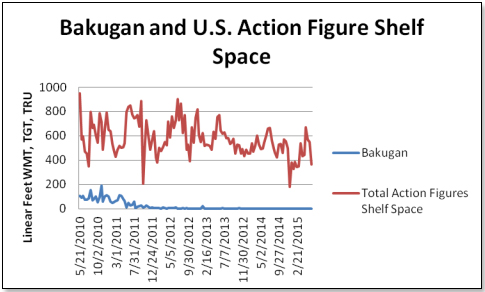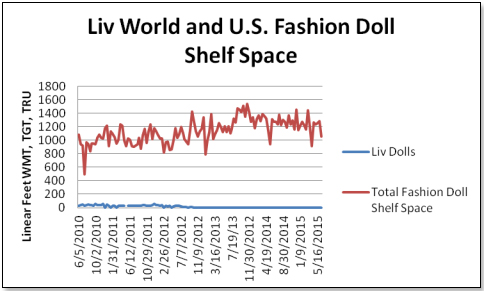
April 2, 2025

July 2015 | Vol. XIV - No. 7
Spin Master – Playing in the big league
Spin Master, the premier Canadian toy company, just made two major announcements. One was that they are planning to acquire Cardinal Industries, Inc. The other was that they are filing for an Initial Public Offering – going public.
While still well behind the three big guys in the toy industry – Hasbro, Lego and Mattel – they are not small potatoes either. Their sales volume is estimated at a little over US$ 900 million this year. Adding Cardinal, this would jump to well over US$ 1 billion.
Before focusing more closely into this latest acquisition by the company, and the implications of their going public, it might be worthwhile to look into where they are today and how they got to this point.
The company was founded in 1994 by three college friends - Ronnen Harary, Anton Rabie, and Ben Varadi. They still today own the company. Their first product was Earth Buddy, a head formed with a nylon stocking and sawdust and covered with grass seed that grew to look like hair. Between now and then, Spin Master has released a host of products – some of their own inventions, some licensed, and some bought outright.
Their most recent acquisition, before Cardinal, was that of Meccano, a French-based construction toy manufacturer with worldwide sales of about $40 million, in 2013.
Spin Master's business is currently in four toy segments – Remote and Interactive 33% or US$ 300 million, Boys Action Figures and Construction 24% or US$ 220 million, Games at 23% or US$ 200 million and finally Preschool and Gifts 20% or US$ 180 million. With Cardinal, whose business is in Games and Puzzles, their Games category will become their top endeavor with an estimated sales value of $310 million. Preschool might also get a lift given the very recent acquisition of the Teletubbies license.
Given their size, you would expect Spin Master to be reasonably prominent at retail in the U.S. and in Europe. This, interestingly, is not really the case and the Cardinal acquisition is unlikely to change this. The reason for this is not that they did not try to break into the big league – they tried and failed several times. One case in point is the Action Figure market. Spin Master's most successful entry, Bakugan, was introduced in 2008, became a run-away success, and then fell off a cliff three years later. This is how the brand's shelf space developed between mid 2010 and mid 2015:

Source: Klosters Retailer Panel
Since then, they also acquired the "How to train your Dragon" license and are doing reasonably well with it. The action figures were the fifth best selling brand at Wal-Mart U.S. and the fourth best selling one at ToysRUs Germany at the end of May, 2015. However, the Dragons never became a major factor in the Action Figure space and are not expected to do so in future given the dominance of the Hasbro-held Marvel/Lucas licenses.
They also attempted to break into another large toy segment – Fashion Dolls. They first tried with Liv World which they introduced in 2009, did well in 2010, declined in 2011 and which was withdrawn in 2012.This is how the brand's shelf space developed between mid 2010 and mid 2015:

Source: Klosters Retailer Panel
They also introduced Victorious Dolls in October 2011 but then cancelled the entire product range in Fall the next year. They then launched the Flutterbye doll range mid 2013 and the brand is now the third best selling Fashion Doll at Target and fourth at Amazon U.S. plus is doing reasonably well in the UK and France. More recently, they also introduced the LaDeeDa and Chatsters ranges. Neither has so far gained traction. None of their entries into the Fashion Doll world appear to represent a real threat to either Mattel's or MGA's business.
Spin Master also has tried to break into the rapidly growing Construction Toy segment, first by launching Ionix in 2013 and then acquiring Meccano, the French manufacturer of the Erector Set range, in August of the same year. Neither has made much progress so far and is unlikely to do so in the foreseeable future given the continued dominance by Lego and the expected expansion of Mega now under the Mattel umbrella.
In all these cases, the basic propositions were very promising but the effort tended to be undercapitalized and the focus of the execution diluted.
Their top ten products at ToysRUs were at the end of June 2015:
| Rank |
Brand |
Product Description |
Introduced |
| 1 |
Marshmallow Flip Open Sofa |
Infant Bedding |
2003 |
| 2 |
Air Hogs |
Inflatable Flying Disc |
1998 |
| 3 |
Paw Patrol |
Action Figures |
2014 |
| 4 |
Mine Craft |
Plush |
2014 |
| 5 |
Flutterbye |
Fashion Doll |
2013 |
| 6 |
Zoomer |
Robots |
2013 |
| 7 |
Kinetic Sand |
Moldable Sand |
2014 |
| 8 |
Sick Bricks |
Hybrid |
2015 |
| 9 |
Cool Baker |
Donut Maker Activity Kit |
2012 |
| 10 |
Headbandz |
Board Game |
2011 |
Source: Klosters Retailer Panel
which suggests that the company's strength today is in niche products not dominated by the majors.
In short, Spin Master is in spite of its size, not a major factor in any of the larger toy categories. However, the acquisition of Cardinal could change this in one category – Games and Puzzles. However, this may be the one place where this is not necessarily a good thing. The reason for this is that Hasbro, now the undisputed market leader, with about 48% market share in the category, may well feel threatened. This could have consequences. A friend of mine, a very seasoned toy executive, put it to me this way: "The risk with Cardinal is that Cardinal obtained the Ideal games license from Mattel, and Puzzles from Hasbro, what is the length of the contract and can it be triggered and taken away thru an acquisition?" . In fact, most license agreements allow termination if either party undergoes major ownership changes.
He added that "as for the Cardinal deal I personally don't see the fit from a management point of view. Anton [Rabie, Spin Master's Co-CEO] and Joel [Berger, Cardinal's President] are two strong personalities."
Stevanne Auerbach, the famous Dr. Toy, sees the company and the Cardinal acquisition in a positive light: "I have known Spin Master from their first Toy Fair and first product. They have always been solid with performance and delivery. Their products have been consistent winners of the Dr Toy Awards. We have always sought the best Canadian companies, and Spin Master leads the way with diversity and innovation. Cardinal is a great game company and it is a perfect match. Sure there will be many surprises in store."
I also asked an old acquaintance of mine, a senior executive at one of the largest toy retailers in Europe, what he thought of Spin Master and the acquisition. His take was that "there are strategic toy companies and then there are opportunistic ones.
The strategic outfits such as Lego, Mattel, Hasbro and MGA, will do everything necessary to dominate the toy category which they consider vital to their survival and will concentrate all their expertise and assets to this end. The opportunistic ones – and Spin Master is a prime example - are reactive in nature. They are offered a license that looks attractive and they run with it even it it is outside their core focus. By doing this, they never allocate enough resources to a specific product or license and hence will not become a major force in any toy area. By buying Cardinal, Spin Master is getting into a lose-lose situation. If they just treat Cardinal the way they have treated other acquisitions – e.g. Meccano – the line will not go anywhere. If they move into a strategic posture and go for dominance in the Game and Puzzle category, they run up against Hasbro who will defend its position in the market place."
Games and Puzzles are Hasbro's cash cow and this business is already vulnerable given the fact that the overall category is declining due to the impact of smart phone and tablet games. Hasbro is unlikely to be passive when faced with a existential competitive threat from Spin Master/Cardinal and yanking the licenses granted to Cardinal could well only be a first response.
What could change the equation for Spin Master is its move to go public. Not only will this bring in a fair amount of capital, it will also allow the company to pay for future acquisitions that could help them broaden their footprint outside North America. In addition, the exposure of going public will introduce disciplines and new directions into the way the company operates which could well have a positive effect.
Copyright © 2025 TDmonthly®, a division of TOYDIRECTORY.com®,
Inc.




